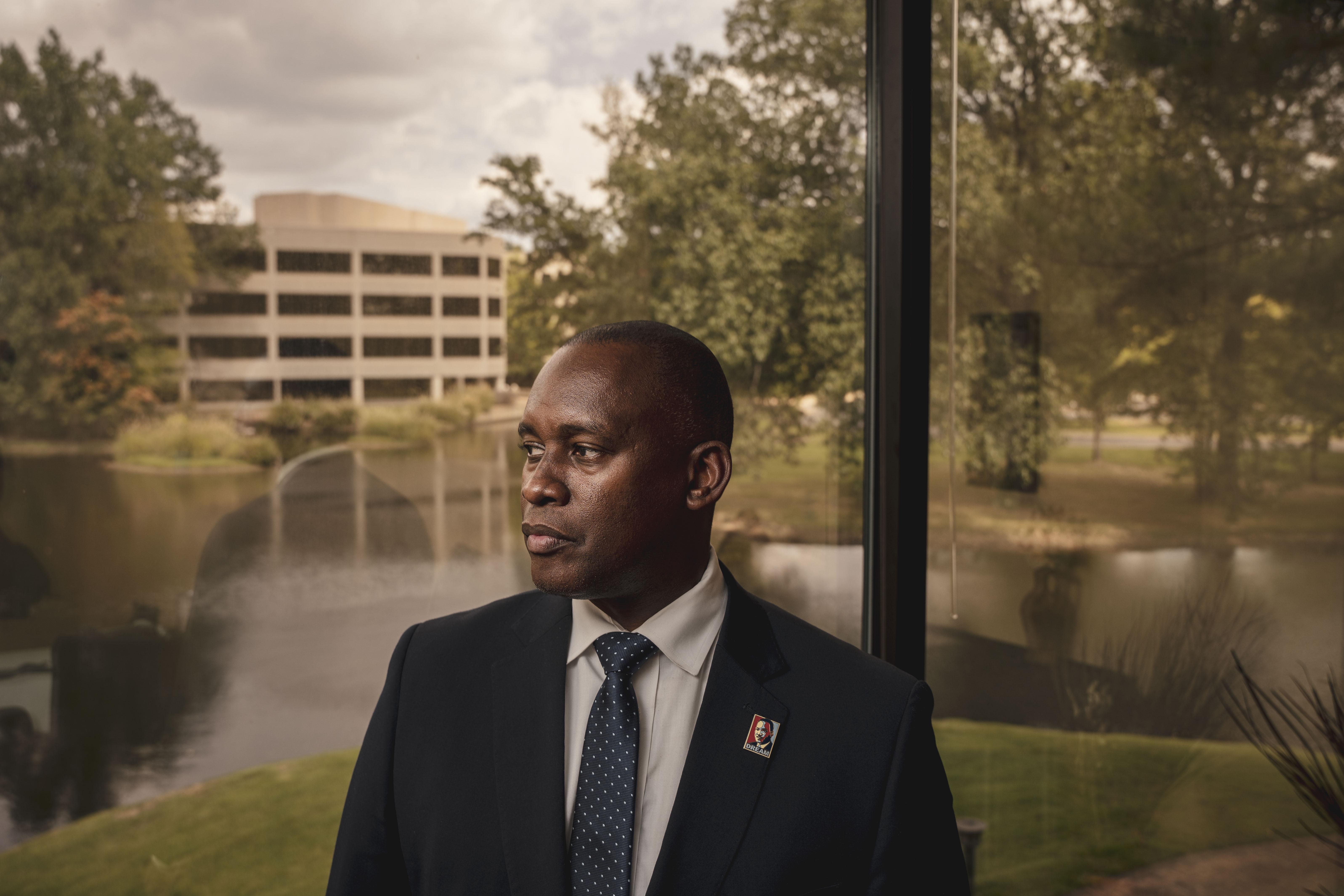
This series is in partnership with the Memphis Flyer.
Much of Van Turner’s past work and position have led to him being critical of policing in Memphis. The 48-year-old lawyer, Memphis NAACP chapter president and former county commissioner has marched in support of unarmed Black people killed by police, including George Floyd, Breonna Taylor and Tyre Nichols.
So it’s not surprising that as he runs to be mayor, he says he’s been asked several times how he can now lead a police force.
During an interview about public safety with The Memphis Flyer and MLK50: Justice Through Journalism, Turner says those experiences are exactly why he should be mayor.
“As I’ve said, I’ve gone against bad policing, but I’ve always supported good policing in the community. And there’s a difference,” he said. “And so I think I can bring credibility to the mayor’s office.
“I’ve been the one who’s been out there in the trenches with the community. When I go and I enact the plan for reform and the comprehensive strategy for better public safety in the community, I think the community will trust what I have to say better than anyone else, because I’ve been there with them in those trenches fighting.”
The following Q&A has been edited for brevity and clarity. This interview was conducted on Aug. 30.
The killing of Tyre Nichols at the hands of the Memphis Police Department has very obviously damaged the community’s trust in the police. What steps would you take to rebuild trust in the police?
I think we first have to have a top-down reform of the Memphis Police Department. We have to look at what the Department of Justice says. Not only will they review the case of Tyre Nichols, they’ll look five years back to see if there was a pattern in practice of these sorts of cases occurring and they were not addressed. Then, I think, we will have to make sure that the training and the leadership is appropriately in place to ensure this does not occur again. And then, finally, I think we need to get back to some of the community policing that we used to have when I was growing up in Whitehaven.
We knew our officers. They were at our schools. They were at the community centers. They were at the football games and track meets. We saw them in church. You had a relationship where if we saw something, we said something, and we were not afraid to contact the authorities or law enforcement in order to address issues. Now that you see this rift between the community and law enforcement, that doesn’t occur like it occurred when I was younger. And so, in order to truly look at resolving public safety of this community, the relationship between the community and law enforcement has to be healed.
How would you describe Cerelyn “C.J.” Davis’ performance as police chief?
I thought she was good as far as being transparent on the release of the Tyre Nichols tape and the reprimand and termination of those five officers. I think perhaps there’s some room for growth and accountability as it relates to the use of this tactical squad being used for just a mere traffic stop and not for something that it was probably organized to do: To take down maybe a drug operation, to go after the heavily armed bad guys that were going to have AR-15 rifles and shoot back. Tyre Nichols was innocent. He had no weapons. He was not speeding. His tags cleared — and he was beat to death. And this tactical unit was responsible for his death. To deploy a team like the team that was deployed in the death of Tyre Nichols was a failure of leadership.
She should be held accountable for this even occurring, pre-beating death of Tyre Nichols. Everything that she’s done post that death, I think, was good. But were there better steps that should have been taken prior to the murder of Nichols? That’s what we still have to analyze.
Do you think you would’ve hired her?
I respect the fact that she’s the first woman and the first Black woman to be in that role. But as I sit here today, I probably would’ve preferred someone local, someone that was homegrown, someone that came through the ranks and perhaps knew the Memphis community a little better, starting out day one.
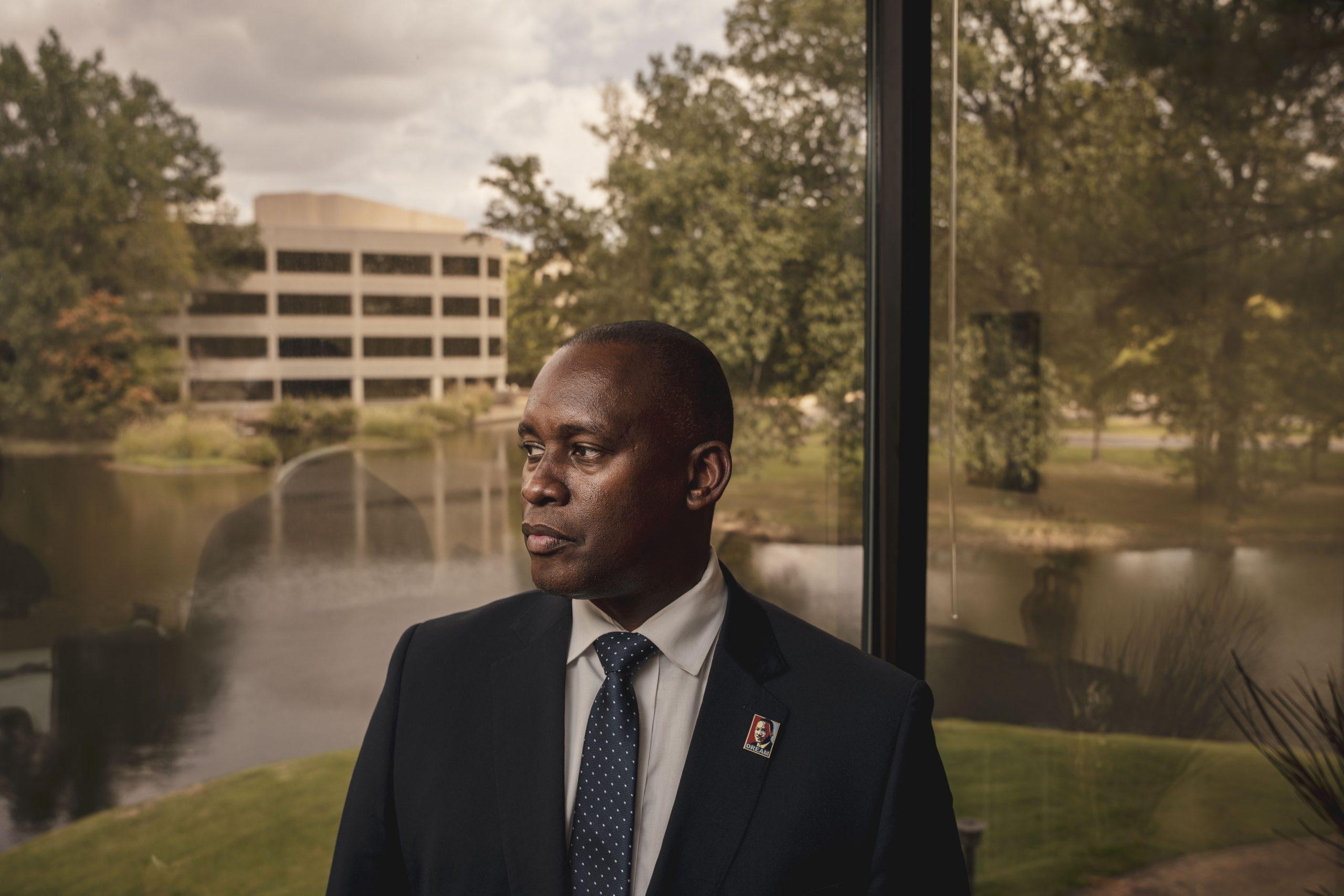
MPD currently has about 1,900 officers and says it needs 2,500 officers. Do you agree that 2,500 is the right number? If not, why not?
I think 2,500 first responders is the right answer. I don’t know if they necessarily all have to be rank-and-file police officers. What we’re learning is that for traffic stops, for mental health cases, for medical emergencies, for unruly students, perhaps first responders who are not rank-and-file, officers could be deployed. I think we do the community and ourselves a disservice when you send in an armed rank-and-file officer to handle some of these situations and perhaps exacerbate the situation.
I do think we need a full complement of first responders, but I would suggest that perhaps 200 to 250 of those first responders should be comprised of specialty units and of specialty officers who can emphasize de-escalation, address mental health issues, address nonviolent, non-threatening traffic stops and address some of the domestic (violence) issues that we see. We really have to look at a comprehensive strategy to resolve crime more effectively in the community.
Where would you look for additional officers?
We should have a hybrid approach. The council voted to not hire outside of the city limits. The state overturned the council’s prerogative and said we could hire outside of city, county and state. We have to navigate the law as it’s written. If we are hiring from outside, we are competing with everyone else. We just increased our pay for officers in the $800 million budget to incentivize officers to come. So did some of the surrounding suburbs. So you can make equal or almost the same in Germantown, but have half the headache. And so you’re competing against those kinds of challenges. And those challenges are gonna remain.
Maybe we should look at diversifying what we consider a first responder in law enforcement. And perhaps they could yield better success in retention and hiring those individuals. But I just think we keep doing what we’re doing, keep recruiting, keep going into our high schools and junior colleges and saying, Hey, you can make a career out of this. I think we just have to keep working at it.
Currently, nearly 40% of Memphis’ total budget goes to policing. Should residents expect that under your administration that share would go up or go down? Or would it stay the same?
My budget would likely be the same if you look at the whole spectrum of public safety. But I would like to increase the budget as it relates to prevention and investments in disinvested communities, disinvested youth, disinvested community centers. I think that’s where we really have to pour a robust allocation of our investments into, because what we’re doing now is not working.
My plan would not be to lock more people up and to keep locking them up month after month after month, and that’s the solution. We are going to get the bad guys off the streets. We are going to make sure that the most hardened criminals are locked away and hopefully rehabilitated. I’ll be tough on those who we need to be tough on. But then I will be equally as balanced as it relates to trying to prevent this pipeline from school to prisons, from Black and brown communities to prison. We have to address that.
I think the community spoke loudly in the election of DA (Steve) Mulroy, as opposed to [former DA Amy] Weirich. They want a comprehensive strategy. They want to focus on intervention and prevention. And I’ll continue that as mayor, I’ll work with DA Mulroy, I’ll work with Juvenile Court Judge (Tarik) Sugarmon to make sure that we have a comprehensive approach to tackling this main issue. So, I will likely increase the funding as it relates to prevention and intervention.
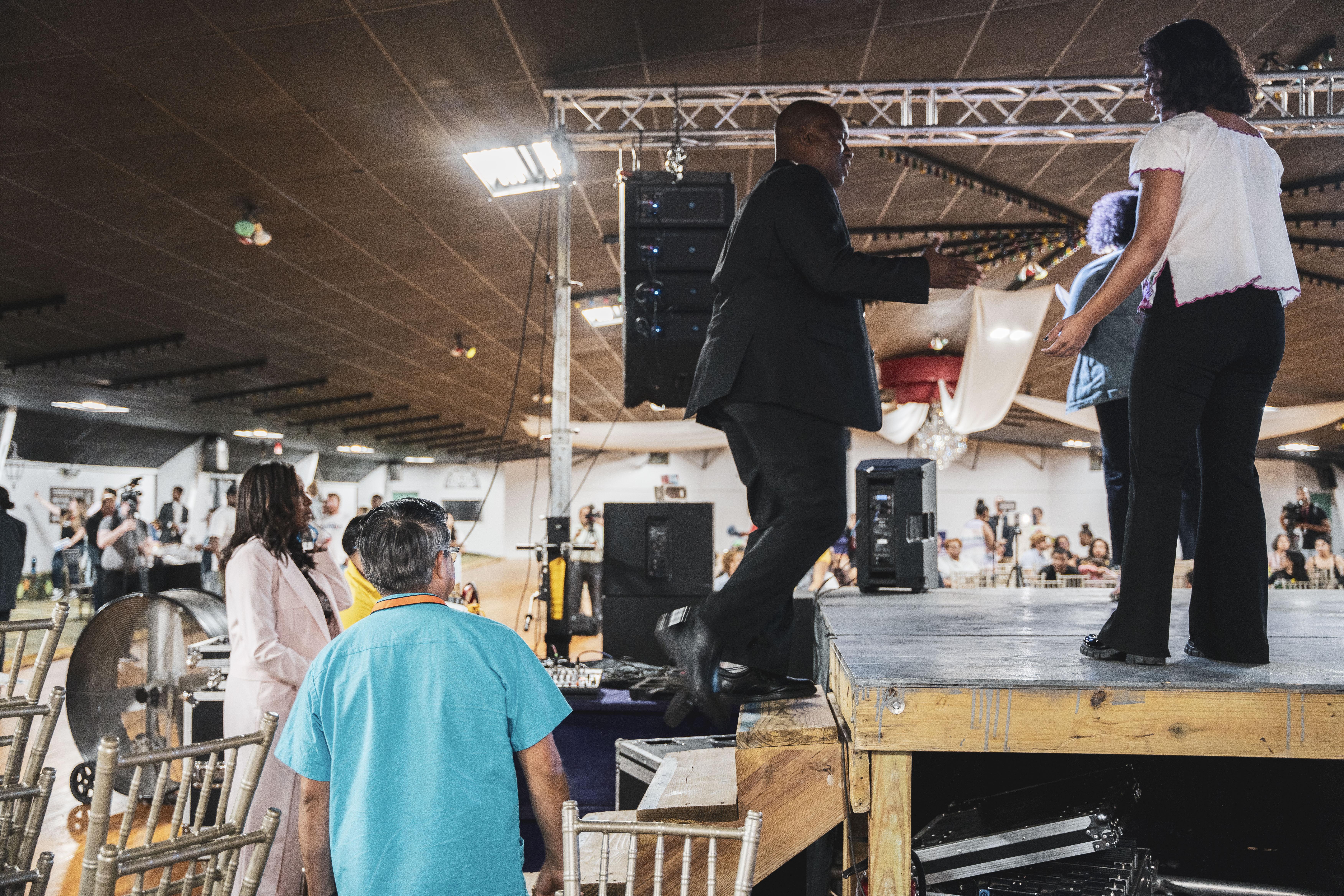
The MPD is currently under a civil rights investigation by the Department of Justice. How do you plan to ensure that the MPD treats all of Memphis’ citizens fairly?
As leadership, top down, we have to make sure that we have a strong transition team. We hear from the community, we go to each community — and I mean each and every community — and we listen. The transition team takes that in, we report out, and then we see if it is the correct way forward to keep the leadership there, or to move away and get new leadership. We focus on training, and we make sure that our most senior officers are being utilized more than perhaps what they’re being utilized now. There were no senior officers (there) the night of the murder of Tyre Nichols. That was a misstep and a problem.
What do you mean? There was nobody on duty or…
All those officers were young on the force, five to seven years. Had there been a 10-year, 12-year, 15-year veteran out there, I’m hopeful that we would’ve had a different result. The senior leadership would’ve kicked in and calmed those young guys down. There were just several issues which we saw that perhaps could have been addressed or remediated with more leadership on the ground. And so that is the second point. And third, we have to focus on recruitment and recruiting the right individuals with the correct temperament, the right mind to serve and protect.
Other than police, name three measures you would take to increase public safety.
I would attempt to hire and retain other first responders besides rank-and-file police officers to address emergency situations. I will focus on intervention. If you look at Craigmont High School, there’s a Boys and Girls Club in the high school, which has a 100% graduation rate, as opposed to [the school’s] 70% graduation rate. We need to put that type of program in all of our challenged high schools and middle schools. I was just in a meeting with First Eight this morning. They work with pre-K literacy, and they work with actually making sure that there’s affordable childcare. I think that’s the other factor. Intervention is what the Boys and Girls Club is doing. And then prevention is focusing in on affordable childcare, focusing in on making sure the literacy rates are where they need to be. And that’s the city’s issue. It is a school board issue, but it becomes a city issue as well because when these young people drop out of school, they become the issue of the city to handle.
What public safety solutions have you seen work in other cities that you would seek to implement here?
The crisis unit, as far as going in and addressing mental health issues without a rank-and-file officer with a gun. That’s something that I’ve seen that’s better. Utilizing technology is something that I’ve seen in other cities, which can be used and deployed. Returning back to, again, community policing — making sure that the officers are in the community as much as possible, building relationships with the young people and with the community.
Some cities have tried to respond to mental health crises with first responders who aren’t police officers. You’ve already said that this is something that you would like to explore. Can you talk about that a little further?
I think that there’s a role for individuals who have that type of expertise to be used by law enforcement and by fire. Oftentimes, EMTs are first on the scene, and there are issues that they have to address which concern mental illness. And they’re not equipped to do so. If it’s a heart attack or a stroke, obviously they’re an emergency medical technician, that’s what they do. But if it’s a mental illness breakdown or something along those lines, neither police nor fire are equipped to do it. And so we need a unit that will do it, that will travel with fire and police and make sure that mental health issues don’t result in death.
We should have someone down at Division 14 of General Sessions (Court). That’s where one would typically go, or at least on that same floor to get an order of protection because of domestic violence. And we need a follow-up. We need that to be given to a caseworker, a first responder for mental illness issues and domestic violence issues. They need to follow up, monitor that situation, make sure that it doesn’t turn into something that’s more violent. And I think that that would be something that could be used here like we’ve seen it in other cities.
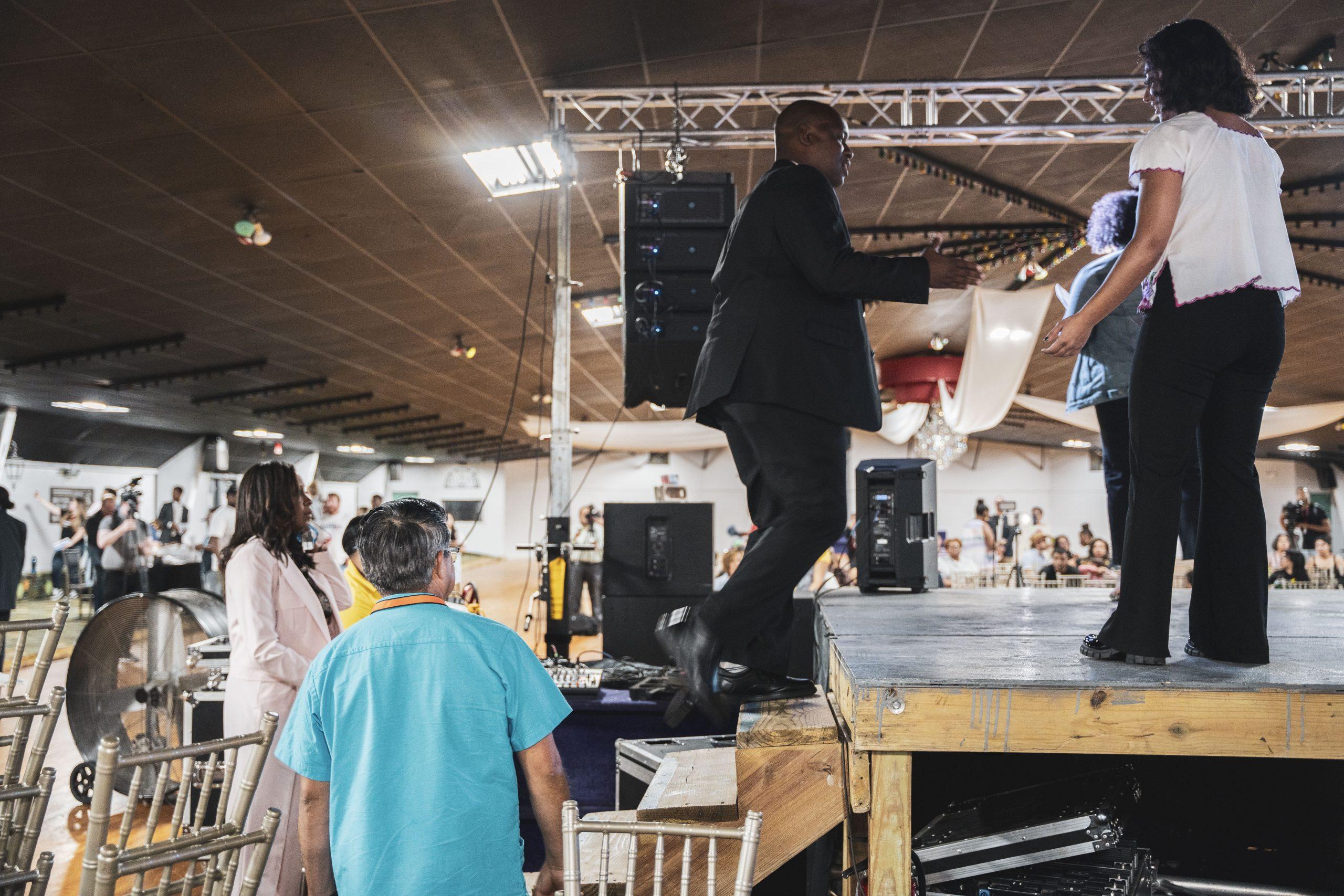
Would you be willing to redirect any funds from policing to address mental health?
I think we have to. Mental health, addiction to drugs, those are not crimes. Those are individuals who need assistance. They don’t need to be killed, and some of them don’t need to be incarcerated. But they do need treatment. If you know anything about our courts, you know that we have all kinds of specialty courts in General Sessions Criminal. We have an environmental court, we have a veterans court, we have a drug court, and we have a domestic violence court. Really bringing together those individuals within those courts and, you know, within the juvenile court system coming together, the school system coming together to try to have a comprehensive strategy, is something that’s missing. I’ve oftentimes said we need to triage and treat this issue of violence in our community like we did the pandemic. We got a report every morning. Everybody was meeting on the subject. We were transparent. We have to take that same comprehensive approach — not point fingers, but work together and be transparent. Give the community a plan to fix it. Lay out the metrics, and then you hold us accountable, and we improve. We do this as partners with the community and all these other organizations.
How do you plan to engage young people and help them avoid gangs and criminal activity?
A kid that joins a gang is looking for love, looking for acceptance, looking for protection, looking for a community. And they find that in the gang because it’s not at home, it’s not at church, it’s not on the football team. You really have to disrupt that pattern of the gangs preying on these vulnerable youth because once they get ahold of them, it’s hard for them to let go, and it’s hard for that young person to get out of it. So we have to step in before the gangs get to them and provide that positive community for them. That’s why [I like] the Boys and Girls Club. It’s a positive community. There’s true advocacy for that young man or woman. That’s why the Boys and Girls Club is effective. And that’s why we need to really scale and expand those kinds of operations within our schools. As a county commissioner, I funded Heal the Hood every year with my grant funding. Heal the Hood is run by Dale Beaver, and he has a gang intervention program and he’s doing great work. We need that in all the communities, and it works.
Memphis always ranks poorly in its number of roadway deaths every year. How would you help make our streets safer without relying solely on increased MPD enforcement?
Perhaps the answer is figuring out some way to say if there are too many infractions, there are too many red lights that have been run through the accidents, that you have a mandatory check-in to reinforce your driving skills. And should you fail again, then you perhaps don’t need your license for an amount of time. I think we’re going to have to get tough on these kinds of issues because you should not be in fear of just going to get groceries, and someone just runs you over and t-bones you.
I do think we have to enact smarter and better measures outside of law enforcement to get a handle on the reckless driving. Driving is a privilege. You don’t have the right to act a fool and kill people because you want to have a little fun.
As mayor, what measures would you take to help get guns off the street?
Obviously, talking to the Tennessee General Assembly won’t work. When the states have failed us in the past, we’ve turned to the federal government. As a civil rights attorney, that’s what I’ll do. I will support litigation to make sure that we at least put all the issues on the table.
I will seek an injunction in federal court, and I know what would likely happen. But the important thing is that we will create a record. We will have experts who will have testimony. We’ll get all those folks on the stand who’ve been ill-affected by gun violence. And then we’ll take that record to the U.S. Congress, and we’ll ask for the United States Congress and for the president to give us relief. We’ve had a ban on assault weapons before. It can happen again. We should not give up on this issue.
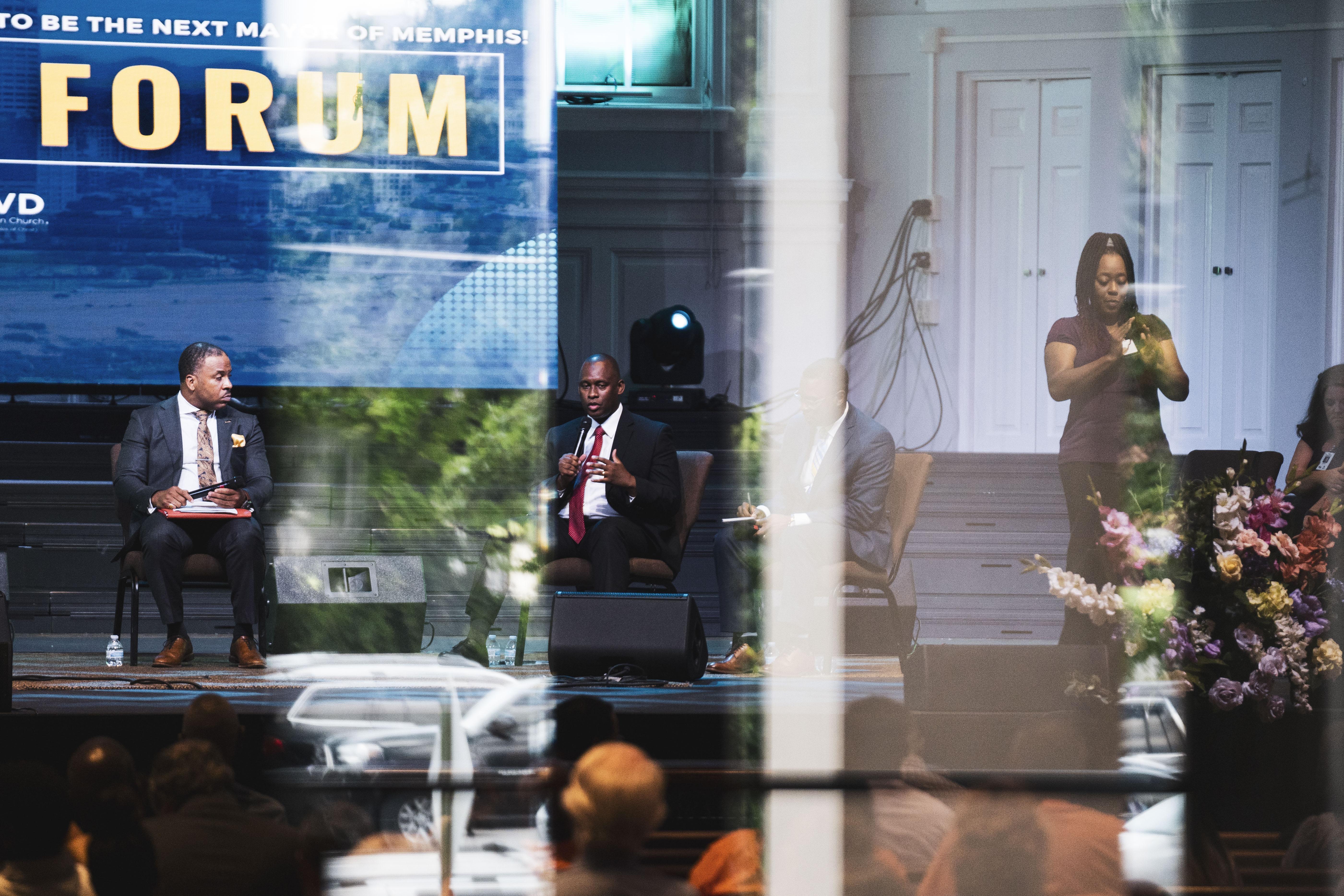
Let me drill down on this just a little bit, please, because you are an attorney. I’m going to state my understanding of what you just said. You tell me how I’m wrong. So the City Council or the County Commission could pass an ordinance that says you have to have a permit to carry a handgun, you can’t have assault rifles in Shelby County, or in the city limits, or whatever. Let’s say we were able to do that, which is not outside of the realm of possibility, right?
Right.
But then the state, the general assembly is going to void those laws. So that’s what you believe would happen in that case.
Right. Then we’d end up in state court, or we could remove it to federal court, depending on what type of litigation, especially if the firearms cross state lines. Then you can use the law, which says if it involves two or more states, you can go to federal court.
As mayor, what is a measure that you, or measures that you could take to reduce car break-ins and theft?
Part of addressing the issues is to not only require a permit to have the gun on your person, but require permits to have guns in your cars. Many times, they’re looking for guns and other valuables. And so if we enact the law to do what we are saying, that will hopefully reduce some of the break-ins. The uptick occurred when we allowed guns in cars without a permit, and every law enforcement person in the state was against what the assembly was doing.
I think, too, you disrupt how they make money off of what they’re doing. You really tackle, and you use good detective work, good policing to break up the chop shops, to break up the shops where they can get the drive-out tags and not have licenses which can be traced. And then I think you, you lean into, ‘Hey, young man or woman, once we catch you, we just can’t let you back out without any parameters or any way of correcting your behavior.’ That’s something that I think the city mayor and Judge Tara Sugarman should get together on and check how we are following through and see what improvements can be made there. Because a lot of these young people are repeat offenders, and they’re young. I think those are measures that can be utilized and things that can be done in order to make sure we are addressing the root cause of the problem.
You want to change the incentives.
Yeah. We want to make it more difficult to make money off the crime. It’s an economic crime. They make money from the chop shop. They make money from what they can find in your car. So, we have to address economics. People who can earn income and provide for themselves and have affordable housing don’t break in cars.
The disinvestment in these communities is also an issue. Poverty that we’ve allowed to fester and grow and be unaddressed. And now we see the result of it. My plan is to make robust investments back into the community, to bring hope, to bring light, to bring investment back into these disinvested communities. We’ll see the change. And that’s what the city hasn’t done.
What are your thoughts about maintaining a curfew on young Memphians?
Yeah, I think that’s, again, an outgrowth of there are not enough activities for young people to engage in which are positive and which can keep them away from the negative behavior. We need 24-hour community centers. We used to have something called Run and Shoot Midnight Basketball. There were other things that just worked. And for the life of me, I don’t know why we stopped doing things that worked. Extended community center hours, which would provide wraparound services, a safe haven, warm meals that the whole community of family and structure that they need. I think those are things that can be done. Obviously, we may have to start out addressing the issue head-on.
You have to meet the emergency need where it is. It’s a crime wave. You have to meet that wave at its height, but then a wave normally drops, and we have to make it drop by bringing down the root causes of why we’re seeing what we’re seeing. And I think once we lean into these extended community center hours, more programming, you know, addressing more activities for our young people, especially over the summer months, we’ll start seeing a change.
This story is brought to you by MLK50: Justice Through Journalism, a nonprofit newsroom focused on poverty, power and policy in Memphis. Support independent journalism by making a tax-deductible donation today. MLK50 is also supported by these generous donors.

